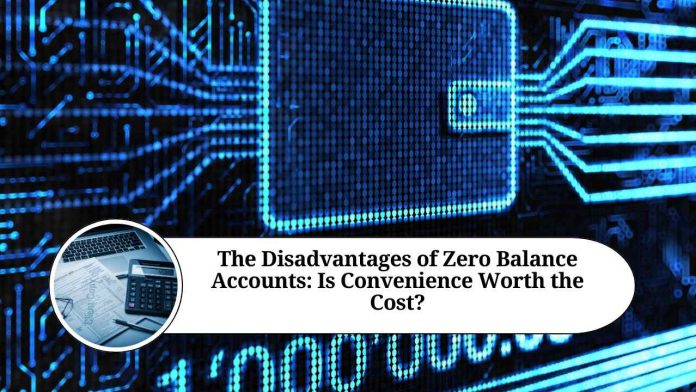Zero balance accounts have gained popularity in recent years, offering individuals a convenient banking option with no minimum balance requirements. These accounts are often marketed as a solution for those who want to avoid fees and have more flexibility in managing their finances. However, while zero balance accounts may seem appealing at first glance, they come with their fair share of disadvantages. In this blog, we will explore the drawbacks of zero balance accounts and help you make an informed decision about whether this type of account is right for you.
Limited Features and Benefits:
One of the significant disadvantages of zero balance accounts is that they often come with limited features and benefits compared to regular savings or checking accounts. Banks may provide basic services such as ATM access, online banking, and a debit card, but they may not offer additional perks like interest on deposits, overdraft protection, or rewards programs. As a result, you may miss out on potential earnings and benefits that could enhance your overall banking experience.
Higher Transaction Fees:
While zero balance accounts may waive the minimum balance requirement, they often come with higher transaction fees. Since the bank cannot rely on the funds in your account to cover any expenses or losses, they compensate by charging higher fees for various banking activities. These fees can include charges for transferring funds, using non-network ATMs, making excessive withdrawals, or even monthly maintenance fees. Over time, these additional charges can add up, making zero balance accounts more expensive than they initially appear.
Limited Credit Opportunities:
Zero balance accounts primarily focus on providing basic banking services and may not offer credit-related products like loans or credit cards. If you are looking to establish credit history or access credit facilities, having a zero balance account might hinder your progress. Traditional savings or checking accounts often serve as a foundation for building a relationship with the bank, enabling you to apply for credit products and access loans when needed. Therefore, a zero balance account might limit your ability to tap into credit opportunities.
Risk of Account Closure:
Zero balance accounts typically have stricter rules and regulations compared to regular accounts. Banks may reserve the right to close your zero balance account if it remains inactive for an extended period or if it becomes dormant. Inactivity could be as simple as not conducting any transactions or maintaining a zero balance for a specific period. Losing access to your account due to account closure can be inconvenient and time-consuming, as you may need to go through the process of opening a new account elsewhere.
Missed Opportunities for Financial Growth:
One of the most significant disadvantages of zero balance accounts is the missed opportunity for financial growth. With no minimum balance requirements, individuals are less incentivized to save and build a substantial emergency fund. Traditional accounts often offer interest on deposits, encouraging customers to save and earn money on their balances. By opting for a zero balance account, you may be foregoing potential interest earnings and hindering your long-term financial goals.
Conclusion:
While zero balance accounts provide convenience and flexibility, it is crucial to consider their drawbacks before committing to this type of banking arrangement. The limited features and benefits, higher transaction fees, limited credit opportunities, risk of account closure, and missed opportunities for financial growth are all significant factors to contemplate. Before opening a zero balance account, evaluate your financial needs, long-term goals, and compare the benefits and limitations of various account types. Ultimately, striking a balance between convenience and financial well-being should be the guiding principle in making an informed decision about your banking needs.
Read more useful content:
- Accounting Software For Manufacturing Small Businesses In India
- Offline vs Online Accounting Software Detailed Comparison
- Free Accounting Software For Small Business in India
- Most Important Advantages & Benefits of Accounting Software
Frequently Asked Questions (FAQs)
Q1: Are zero balance accounts completely free of fees?
A1: While zero balance accounts may waive the minimum balance requirement, they often come with higher transaction fees. These fees can include charges for transferring funds, using non-network ATMs, making excessive withdrawals, or even monthly maintenance fees. It’s important to carefully review the fee structure of a zero balance account to understand the potential costs involved.
Q2: Can I access credit facilities with a zero balance account?
A2: Zero balance accounts primarily focus on providing basic banking services and may not offer credit-related products like loans or credit cards. If you are looking to establish credit history or access credit facilities, having a zero balance account might hinder your progress. It’s advisable to explore traditional savings or checking accounts that can serve as a foundation for building a relationship with the bank and accessing credit opportunities.
Q3: Is there a risk of my zero balance account being closed?
A3: Yes, there is a risk of account closure with zero balance accounts. Banks may reserve the right to close your account if it remains inactive for an extended period or if it becomes dormant. Inactivity could be as simple as not conducting any transactions or maintaining a zero balance for a specific period. It’s important to understand the account terms and conditions to avoid the inconvenience of losing access to your account.
Q4: Can I earn interest on the funds in a zero balance account?
A4: Generally, zero balance accounts do not offer interest on deposits. These accounts are primarily designed for basic banking services and may not provide the same financial growth opportunities as traditional savings or checking accounts. If earning interest on your balances is important to you, it is advisable to explore other account options that offer interest-earning capabilities.
Q5: Are zero balance accounts suitable for long-term financial goals?
A5: Zero balance accounts may not be the most suitable option for long-term financial goals. Without minimum balance requirements, individuals are less incentivized to save and build a substantial emergency fund. Traditional accounts often offer interest on deposits, encouraging customers to save and earn money on their balances. By opting for a zero balance account, you may be foregoing potential interest earnings and hindering your long-term financial goals.
Q6: Can I use a zero balance account for regular banking needs?
A6: Yes, you can use a zero balance account for regular banking needs such as ATM access, online banking, and making transactions. However, it’s important to be aware of the potential limitations and fees associated with these accounts. It is advisable to carefully evaluate your banking needs and consider whether the features and benefits provided by a zero balance account meet your requirements effectively.




















